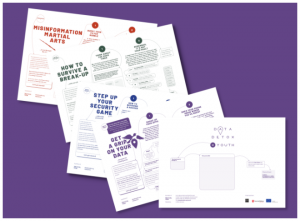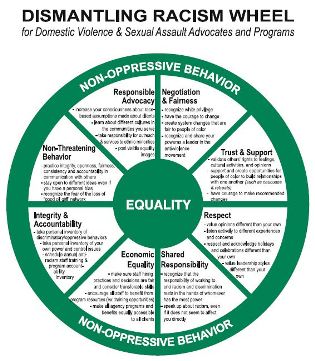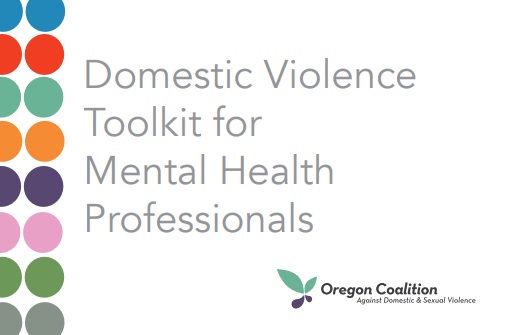Resources Library: Population-Specific Response
Start a Search:
Culture, Language, and Access: Key Considerations for Serving Deaf Survivors of Domestic and Sexual Violence
This policy and practice brief summarizes the findings from work with the Deaf community and offers practical suggestions for increasing Deaf survivors’ access to victim services and other supports, including those offered by the criminal justice and medical systems. This information providse a framework for meeting the needs of Deaf survivors that is grounded in the cultural and linguistic needs of this community. It will also ground policymakers, practitioners, and first responders in the victim services field in the realities of this often-overlooked community.
Data Detox x Youth

Data Detox x Youth is an activity book to help young people take control of their tech. This interactive toolkit encourages young people to think about different aspects of their digital lives, from their social media profiles to their passwords, with simple activities for reflection and play.
The activity book contains four sections:
- Digital Privacy, which focuses on reducing data traces and understanding online profiling;
- Digital Security, with tips on creating strong and secure passwords;
- Digital Wellbeing, which deals with the addictive nature of smartphones;
- and finally Misinformation, a guide for consuming and sharing information online.
The toolkit is designed for 11 to 16-year-olds who already have their own devices, but it can be used by people of all ages. All you need is a smartphone or a tablet, a printer and something to write with.
Places where the Data Detox x Youth could be used:
- In a classroom (or virtual classroom)
- At home
- By youth groups and organisations (e.g. in a workshop)
Also available in العربية (Arabic), Basque, Brazilian Português, Čeština (Czech), Deutsch, Español, Ελληνικά (Greek), Italiano, Nederlands, Norsk, Português and Shan.
Dismantling Racism Resources

Two wheels created by the Women of Color Caucus and Social Justice Task Force of the Virginia Sexual and Domestic Violence Action Alliance. These wheels were created in the tradition of the Power and Control Wheel created by the Domestic Abuse Intervention Programs of Duluth, Minnesota. The Perpetuating Racism Wheel demonstrates how agencies might use power and control to perpetuate racism. The Dismangling Racism Wheel demonstrates how agencies can use principles of equaliaty to dismantle racism within their agencies.
Domestic Violence And Housing Stability: A Role For DV Programs
Within the DV movement, our dedication to that first and most elemental step—ensuring that there is a route toward safety—is reflected in our decades long commitment to building and protecting emergency shelter capacity. Yet today, some communities are implementing new service models less reliant on emergency shelter as survivors’ primary gateway to domestic violence advocacy and aimed instead at being more responsive to the specific needs of each survivor. And some shelters are closing their doors. Is this a sign that we are losing ground—or that we are becoming more flexible?
A change from the traditional communal living shelters, which are important and cherished programs, is gut-wrenching for many of us. However, in many ways it’s our success that has brought us to this important juncture as a movement and opened the way to a re-envisioning of the work ahead. Having created more avenues to basic safety in many communities, we can turn our focus to developing new approaches to assisting survivors who are still isolated from help or who need resources other than emergency services.
Click here to view this resource.
Domestic Violence Toolkit for Mental Health Professionals

The Oregon Coalition Against Domestic & Sexual Violence (OCADSV) provides a toolkit for mental health professionals to better understand the links between mental health and domestic violence. It examines how DV is expressed and what that poses for those who are impacted by these forms of DV.

